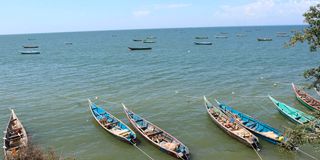Why GBV victims on L Victoria islands suffer in silence

Boats dock at Litare Beach in Rusinga Island in Homa Bay County on October 31, 2022. Many GBV victims in the county suffer in silence.
What you need to know:
- While officers have been deployed to offer security in some islands, their duty is mainly to fight smuggling of contraband goods and other illegal business.
- Distance to the mainland slow down the process of accessing services such as health, SGBV referrals and other issues affecting residents.
- At least two cases of SGBV are reported in Mfangano Island every week.
Sometime last year, Mary (not her real name) found herself surrounded by three heavily built men as she was walking home at night.
She was not concerned about her safety even though she was alone in the dark. She thought she was safe because women in her village in Mfangano Island, Homa Bay County, had never reported cases of sexual and gender-based violence (SGBV).
But she was wrong.
Mary could not immediately establish the men’s intention when they started touching her after catching up with her.
“All indications showed they were up to something bad. They did not say anything,” she says.
When she threatened to raise an alarm, the men whom she could not immediately identify, ran off into the darkness.
The following morning, she reported the case at Sena Police Station but later withdrew when she realised the case would not go anywhere.
At the station, she asked whether she could speak to a female police officer who she thought would understand her predicament better.
To her surprise, Mary was told the station has only male officers.
“I decided not to report the case at the station. I had a feeling the male officers would not have understood and helped me,” she says.
If the case was to be reported and suspects arrested, they would have been charged with attempted rape.
Search for justice
Women in her village and the entire island are among those who have suffered in the hands of rogue men, but have not reported their ordeals.
Teenage girls have equally been preyed upon by sex pests, but victims’ families reportedly settle the matters at home because of the prolonged search for justice.
Just like Mary, other women have tried to report cases of GBV at the station in Mfangano Island, but later withdraw. The absence of female police officers gives them little confidence.
Lake Victoria islands, despite having police officers, do not have gender desks where cases involving women and children can be handled.
Inhabited islands in Homa Bay include Mfangano, Remba, Ringiti, Takawiri, Kibuogi, Kiwa, Ngodhe, Rusinga and Sukru.
While officers have been deployed to offer security in some islands, their duty is mainly to fight smuggling of contraband goods and other illegal business.
This has led to a rise in cases of SGBV and other vices that mainly affect women and receive little attention from the police.
Mfangano East Location Chief Samuel Dwele, says female administrators have been involved in handling sexual offence cases.
“Absence of female police officers does not mean the cases should end. The island has female assistant chiefs who can equally handle the cases,” he says.
But should the cases be reported and the process of finding justice launched, other factors like distance to the mainland have slowed down the process.
SGBV referrals
Access to government services such as health, SGBV referrals and other issues affecting residents of the islands has been a long-running challenge.
In Takawiri, which has no police officers, residents must call Sena Police Station to report crime. Takawiri Beach Management Unit chairman Bernard Ongata, says it takes time for police to arrive when they are called.
“It’s a short distance between the islands. But if no boats are available, the officers may fail to come,” he says.
Sometimes, residents are forced to take suspects to the station themselves.
According to Mfangano Island Community Paralegals chairman Wycliffe Kidera, at least two cases of SGBV are reported in the island every week but they are not entered into government records.
The group helps victims of these vices get justice. But their work comes with its own challenges.
Mr Kidera says the islands have many illiterate people and education on sexual and reproductive health is not prioritised.
“Most of them do not know that people are entitled to rights and freedoms. They hang on cultural beliefs that have long been overtaken by time,” he says.
Among the cultural practices include battering women for any wrongdoing.
Mr Kidera says some families also believe in a practice locally referred to as thuol odonjo e koo, meaning family secrets should not be shared with the outside world. Therefore, when women and children are sexually violated, most families settle the cases at home.
Single-room house
“If it involves teenage girls, the victims are married off to the suspects. This has become the norm,” he says.
He adds that poverty is also a major hindrance to the SGBV fight.
At the beaches, most families live in single-room houses. Therefore, most fishermen, Mr Kidera says, engage in sexual activities in the presence of their children.
“Cases of teenagers engaging in sex is also a problem. Most of them witness the act at home and try to practice it with their friends,” he says.
Members of Mr Kidera’s group have been receiving some cases of defilement and GBV. But their attempts to ensure victims get justice are hindered by the inaccessibility of hospitals and courts.
Sexual offences cases, he says, are mostly handled in Mbita town where the sub-county hospital is located. This is because medical officers at Sena Hospital, which is the main health facility on Mfangano Island shy off from examining victims.
“Upon examination, they are supposed to write a report (P3 form) that will later be presented in court. Health workers from the hospital do not want this because they will be summoned to testify,” Mr Kidera says.
The journey from Mfangano to Mbita town takes at least one hour and costs Sh250. The local chief admits that this is a challenge for many as they seek justice. It is also part of the reason why health workers from Mfangano Island avoid getting involved in the court cases, which often drag on for months.
Teenage girls
Mr Kidera adds that sometimes the sexual offence suspects are arrested but because their victims fail to process evidence to be presented in court, they end up walking free.
“Some victims have suffered more than once in the hands of the same people. One advantage that perpetrators have is lack of mechanisms to process the cases,” he says.
County Commissioner Moses Lilan, says he will not sit back and watch women and teenage girls suffer. According to him, up to 50 cases of SGBV are reported in the county every month.
He challenges administrators to pull up their socks in the fight against the vice.
But it is not all doom and gloom; there have been cases where action was taken against culprits. Mr Kidera says the paralegals have sent some suspects to prison.
His group is now calling on the government to have a mobile court to serve the islands.
“This will ensure cases are processed fast. Some people lose hope in the judicial system just because of the difficulties they undergo when moving to the courts,” Mr Kidera says.





